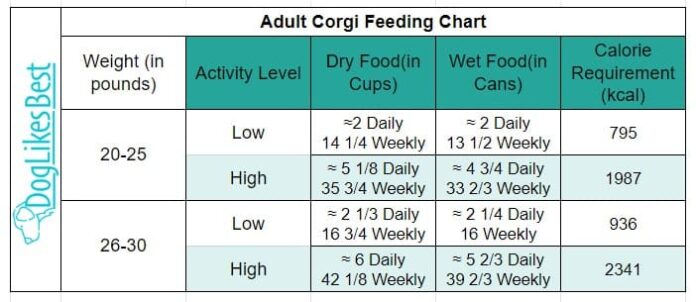As a corgi parent getting the right corgi feeding chart is crucial for maintaining your pup’s health and happiness. These adorable loaves of bread with legs need specific nutrition to support their unique body structure and energy levels. At Pet like boss we understand the importance of proper feeding guidelines for your furry friend.
Understanding Your Corgi’s Nutritional Needs
Before diving into the corgi feeding chart, it’s essential to understand that these herding dogs have specific dietary requirements due to their working dog heritage and distinctive physique.
Age-Based Feeding Guidelines
Puppy Stage (8 weeks – 12 months)
- 3-4 meals per day
- 1 to 1.5 cups of food daily
- High-protein puppy formula recommended
- More frequent meals to support rapid growth
Adult Stage (1-7 years)
- 2 meals per day
- 1.5 to 2 cups of food daily
- Balanced protein and fat content
- Monitor portion sizes to prevent obesity
Senior Stage (7+ years)
- 2 meals per day
- 1 to 1.5 cups of food daily
- Lower calorie options
- Added supplements for joint health
Weight-Based Corgi Feeding Chart
| Weight (lbs) | Daily Food Amount (cups) ||————–|————————-|| 10-15 | 1.0-1.25 || 15-20 | 1.25-1.5 || 20-25 | 1.5-1.75 || 25-30 | 1.75-2.0 |
Special Considerations
Your corgi’s metabolism plays a crucial role in determining their ideal food intake Consider these factors when using the corgi feeding chart
-
Activity Level
- Active/Working: Increase portions by 20%
- Sedentary: Decrease portions by 10%
- Regular exercise: Standard portions
-
Health Conditions
- Diabetes
- Joint issues
- Weight management needs
Best Feeding Practices
Timing Matters
- Maintain consistent feeding schedule
- Last meal 2-3 hours before bedtime
- Fresh water available 24/7
Food Selection Tips
- High-quality protein sources
- Moderate fat content
- Complex carbohydrates
- Essential vitamins and minerals
Common Feeding Mistakes to Avoid
- Overfeeding
- Table scraps
- Low-quality food
- Inconsistent feeding times
Signs Your Feeding Chart Needs Adjustment
-
Weight Changes
- Rapid weight gain
- Unexplained weight loss
- Difficulty maintaining ideal weight
-
Energy Levels
- Lethargy
- Hyperactivity
- Inconsistent energy
-
Digestive Issues
- Irregular bowel movements
- Excessive gas
- Stomach sensitivity
Transitioning Food Tips
When changing your corgi’s diet:1. Gradual transition over 7-10 days2. Mix old and new food3. Monitor digestion4. Adjust portions as needed
Special Dietary Considerations
Pregnant/Nursing Corgis
- Increase food intake by 25-50%
- Multiple small meals
- Higher protein content
- Premium quality food
Active/Working Corgis
- Higher caloric intake
- More protein
- Frequent small meals
- Performance-focused formulas
Supplements and Treats
Recommended Supplements
- Glucosamine for joints
- Omega-3 fatty acids
- Probiotics
- Multivitamins (if recommended)
Treat Guidelines
- 10% rule for treats
- Healthy options only
- Size-appropriate portions
- Training rewards consideration
Monitoring Your Corgi’s Health
Regular Health Checks
- Weekly weigh-ins
- Body condition scoring
- Energy level assessment
- Coat quality evaluation
When to Consult a Vet
- Sudden weight changes
- Digestive issues
- Loss of appetite
- Unusual behavior
Tips for Success
- Measure portions accurately
- Use appropriate bowls
- Store food properly
- Keep feeding records
- Adjust as needed
Seasonal Adjustments
Summer Feeding
- More water
- Lighter meals
- Cooler feeding times
- Fresh ingredients
Winter Feeding
- Slightly increased portions
- Warm water available
- Indoor feeding spots
- Additional calories if needed
Following an appropriate corgi feeding chart is essential for your pup’s health and happiness. Remember that every dog is unique, and these guidelines should be adjusted based on your corgi’s individual needs. Regular monitoring and vet consultations will help ensure your feeding plan remains optimal for your furry friend.
Remember to visit Pet like boss for more detailed information about pet care and nutrition. Your corgi’s health journey is our priority, and we’re here to support you every step of the way!












